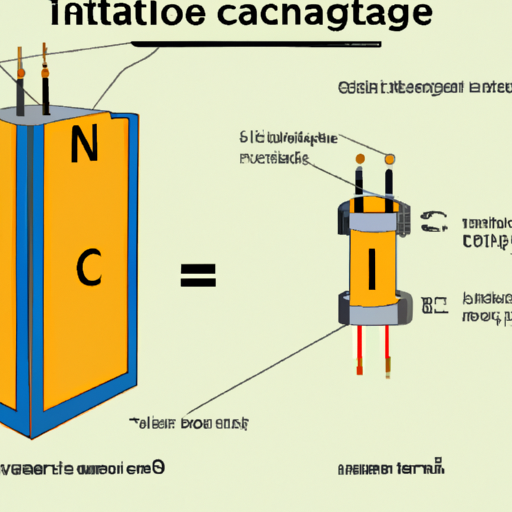Understanding High-Voltage Capacitors

I. Introduction
High-voltage capacitors are essential components in various electronic and electrical systems, playing a crucial role in energy storage, power management, and signal processing. Defined as capacitors designed to operate at voltages significantly higher than standard capacitors, they are vital in applications ranging from industrial machinery to consumer electronics. This article aims to provide a comprehensive understanding of high-voltage capacitors, exploring their characteristics, applications, safety considerations, maintenance, and future trends.
II. Basics of Capacitors
A. What is a Capacitor?
A capacitor is an electronic component that stores electrical energy in an electric field. It consists of two conductive plates separated by an insulating material known as a dielectric. When a voltage is applied across the plates, an electric field is created, allowing the capacitor to store energy. The primary function of a capacitor is to store and release electrical energy, making it a fundamental component in various electronic circuits.
B. Types of Capacitors
Capacitors come in various types, each suited for specific applications. Some common types include:
1. **Electrolytic Capacitors**: Known for their high capacitance values, these capacitors are polarized and typically used in power supply circuits.
2. **Ceramic Capacitors**: These capacitors are non-polarized and are often used in high-frequency applications due to their stability and low losses.
3. **Film Capacitors**: Made from thin plastic films, these capacitors are known for their reliability and are commonly used in audio and power applications.
4. **High-Voltage Capacitors**: Specifically designed to handle high voltage levels, these capacitors are crucial in applications where standard capacitors would fail.
III. Characteristics of High-Voltage Capacitors
A. Voltage Ratings and Their Significance
High-voltage capacitors are rated for specific voltage levels, which indicate the maximum voltage they can safely handle. Exceeding this voltage can lead to capacitor failure, resulting in short circuits or even explosions. Understanding voltage ratings is essential for selecting the right capacitor for a given application.
B. Capacitance Values and Their Impact on Performance
Capacitance, measured in farads, indicates the amount of electrical charge a capacitor can store. High-voltage capacitors typically have capacitance values ranging from microfarads (µF) to farads (F). The capacitance value affects the performance of the capacitor in a circuit, influencing factors such as energy storage capacity and response time.
C. Dielectric Materials Used in High-Voltage Capacitors
The dielectric material used in high-voltage capacitors significantly impacts their performance and reliability. Common dielectric materials include:
1. **Polypropylene**: Known for its high insulation resistance and low dielectric losses, polypropylene is widely used in high-voltage applications.
2. **Polyester**: This material offers good thermal stability and is often used in applications requiring moderate voltage ratings.
Each dielectric material has its advantages and disadvantages, affecting factors such as temperature tolerance, voltage rating, and overall performance.
IV. Applications of High-Voltage Capacitors
High-voltage capacitors find applications across various industries, including:
A. Power Electronics
1. **Inverters and Converters**: High-voltage capacitors are essential in inverters and converters, where they help manage energy flow and improve efficiency.
2. **Energy Storage Systems**: In renewable energy systems, such as solar and wind, high-voltage capacitors store excess energy for later use, ensuring a stable power supply.
B. Industrial Applications
1. **Motor Drives**: High-voltage capacitors are used in motor drives to improve performance and efficiency, providing the necessary power for industrial machinery.
2. **Power Factor Correction**: These capacitors help improve the power factor in electrical systems, reducing energy losses and improving overall system efficiency.
C. Consumer Electronics
1. **High-End Audio Equipment**: In audio systems, high-voltage capacitors enhance sound quality by providing stable power and reducing distortion.
2. **Electric Vehicles**: High-voltage capacitors are crucial in electric vehicles, where they store energy for acceleration and regenerative braking.
D. Medical Devices
1. **Imaging Equipment**: High-voltage capacitors are used in medical imaging devices, such as MRI machines, to provide the necessary power for imaging processes.
2. **Defibrillators**: These life-saving devices rely on high-voltage capacitors to deliver the necessary electrical shock to restore normal heart rhythm.
V. Safety Considerations
A. Risks Associated with High-Voltage Capacitors
Working with high-voltage capacitors poses several risks, including:
1. **Electric Shock Hazards**: High-voltage capacitors can store significant amounts of energy, posing a risk of electric shock if not handled properly.
2. **Explosion Risks**: If a high-voltage capacitor fails, it can explode, causing damage to surrounding components and posing a safety risk to personnel.
B. Proper Handling and Storage
To mitigate risks, it is essential to follow proper handling and storage procedures for high-voltage capacitors. This includes discharging capacitors before handling, using insulated tools, and storing capacitors in a dry, cool environment.
C. Importance of Protective Equipment
When working with high-voltage capacitors, wearing appropriate protective equipment, such as gloves and safety goggles, is crucial to ensure personal safety.
VI. Maintenance and Lifespan
A. Factors Affecting the Lifespan of High-Voltage Capacitors
Several factors can affect the lifespan of high-voltage capacitors, including:
1. **Temperature and Humidity**: Extreme temperatures and high humidity levels can degrade capacitor performance and shorten lifespan.
2. **Voltage Stress**: Operating a capacitor near or above its rated voltage can lead to premature failure.
B. Signs of Failure and When to Replace
Common signs of capacitor failure include bulging, leaking, or discoloration. Regular inspection and testing can help identify failing capacitors before they cause significant issues.
C. Best Practices for Maintenance
To extend the lifespan of high-voltage capacitors, it is essential to follow best practices, such as maintaining optimal operating conditions, performing regular inspections, and replacing aging capacitors proactively.
VII. Future Trends in High-Voltage Capacitor Technology
A. Innovations in Materials and Design
Advancements in materials science are leading to the development of new dielectric materials that offer improved performance and reliability in high-voltage capacitors.
B. Increasing Demand in Renewable Energy Applications
As the demand for renewable energy sources continues to grow, high-voltage capacitors will play a critical role in energy storage and management systems, ensuring efficient energy use.
C. Potential for Miniaturization and Enhanced Performance
Ongoing research aims to miniaturize high-voltage capacitors while enhancing their performance, making them suitable for a broader range of applications.
VIII. Conclusion
High-voltage capacitors are integral to modern technology, enabling efficient energy storage and management across various applications. Understanding their characteristics, applications, and safety considerations is essential for anyone working with or studying electrical systems. As technology continues to evolve, high-voltage capacitors will remain a vital component in driving innovation and efficiency in the electrical and electronic industries.
IX. References
For further reading and resources on high-voltage capacitors, consider exploring the following:
1. "Capacitor Technology: A Comprehensive Guide" - A detailed book on capacitor design and applications.
2. IEEE Standards for Capacitors - Industry standards and guidelines related to capacitor performance and safety.
3. Online courses on electronics and electrical engineering - Many platforms offer courses that cover capacitors and their applications in depth.
By delving deeper into the world of high-voltage capacitors, you can gain a better understanding of their significance and the role they play in shaping modern technology.
Understanding High-Voltage Capacitors

I. Introduction
High-voltage capacitors are essential components in various electronic and electrical systems, playing a crucial role in energy storage, power management, and signal processing. Defined as capacitors designed to operate at voltages significantly higher than standard capacitors, they are vital in applications ranging from industrial machinery to consumer electronics. This article aims to provide a comprehensive understanding of high-voltage capacitors, exploring their characteristics, applications, safety considerations, maintenance, and future trends.
II. Basics of Capacitors
A. What is a Capacitor?
A capacitor is an electronic component that stores electrical energy in an electric field. It consists of two conductive plates separated by an insulating material known as a dielectric. When a voltage is applied across the plates, an electric field is created, allowing the capacitor to store energy. The primary function of a capacitor is to store and release electrical energy, making it a fundamental component in various electronic circuits.
B. Types of Capacitors
Capacitors come in various types, each suited for specific applications. Some common types include:
1. **Electrolytic Capacitors**: Known for their high capacitance values, these capacitors are polarized and typically used in power supply circuits.
2. **Ceramic Capacitors**: These capacitors are non-polarized and are often used in high-frequency applications due to their stability and low losses.
3. **Film Capacitors**: Made from thin plastic films, these capacitors are known for their reliability and are commonly used in audio and power applications.
4. **High-Voltage Capacitors**: Specifically designed to handle high voltage levels, these capacitors are crucial in applications where standard capacitors would fail.
III. Characteristics of High-Voltage Capacitors
A. Voltage Ratings and Their Significance
High-voltage capacitors are rated for specific voltage levels, which indicate the maximum voltage they can safely handle. Exceeding this voltage can lead to capacitor failure, resulting in short circuits or even explosions. Understanding voltage ratings is essential for selecting the right capacitor for a given application.
B. Capacitance Values and Their Impact on Performance
Capacitance, measured in farads, indicates the amount of electrical charge a capacitor can store. High-voltage capacitors typically have capacitance values ranging from microfarads (µF) to farads (F). The capacitance value affects the performance of the capacitor in a circuit, influencing factors such as energy storage capacity and response time.
C. Dielectric Materials Used in High-Voltage Capacitors
The dielectric material used in high-voltage capacitors significantly impacts their performance and reliability. Common dielectric materials include:
1. **Polypropylene**: Known for its high insulation resistance and low dielectric losses, polypropylene is widely used in high-voltage applications.
2. **Polyester**: This material offers good thermal stability and is often used in applications requiring moderate voltage ratings.
Each dielectric material has its advantages and disadvantages, affecting factors such as temperature tolerance, voltage rating, and overall performance.
IV. Applications of High-Voltage Capacitors
High-voltage capacitors find applications across various industries, including:
A. Power Electronics
1. **Inverters and Converters**: High-voltage capacitors are essential in inverters and converters, where they help manage energy flow and improve efficiency.
2. **Energy Storage Systems**: In renewable energy systems, such as solar and wind, high-voltage capacitors store excess energy for later use, ensuring a stable power supply.
B. Industrial Applications
1. **Motor Drives**: High-voltage capacitors are used in motor drives to improve performance and efficiency, providing the necessary power for industrial machinery.
2. **Power Factor Correction**: These capacitors help improve the power factor in electrical systems, reducing energy losses and improving overall system efficiency.
C. Consumer Electronics
1. **High-End Audio Equipment**: In audio systems, high-voltage capacitors enhance sound quality by providing stable power and reducing distortion.
2. **Electric Vehicles**: High-voltage capacitors are crucial in electric vehicles, where they store energy for acceleration and regenerative braking.
D. Medical Devices
1. **Imaging Equipment**: High-voltage capacitors are used in medical imaging devices, such as MRI machines, to provide the necessary power for imaging processes.
2. **Defibrillators**: These life-saving devices rely on high-voltage capacitors to deliver the necessary electrical shock to restore normal heart rhythm.
V. Safety Considerations
A. Risks Associated with High-Voltage Capacitors
Working with high-voltage capacitors poses several risks, including:
1. **Electric Shock Hazards**: High-voltage capacitors can store significant amounts of energy, posing a risk of electric shock if not handled properly.
2. **Explosion Risks**: If a high-voltage capacitor fails, it can explode, causing damage to surrounding components and posing a safety risk to personnel.
B. Proper Handling and Storage
To mitigate risks, it is essential to follow proper handling and storage procedures for high-voltage capacitors. This includes discharging capacitors before handling, using insulated tools, and storing capacitors in a dry, cool environment.
C. Importance of Protective Equipment
When working with high-voltage capacitors, wearing appropriate protective equipment, such as gloves and safety goggles, is crucial to ensure personal safety.
VI. Maintenance and Lifespan
A. Factors Affecting the Lifespan of High-Voltage Capacitors
Several factors can affect the lifespan of high-voltage capacitors, including:
1. **Temperature and Humidity**: Extreme temperatures and high humidity levels can degrade capacitor performance and shorten lifespan.
2. **Voltage Stress**: Operating a capacitor near or above its rated voltage can lead to premature failure.
B. Signs of Failure and When to Replace
Common signs of capacitor failure include bulging, leaking, or discoloration. Regular inspection and testing can help identify failing capacitors before they cause significant issues.
C. Best Practices for Maintenance
To extend the lifespan of high-voltage capacitors, it is essential to follow best practices, such as maintaining optimal operating conditions, performing regular inspections, and replacing aging capacitors proactively.
VII. Future Trends in High-Voltage Capacitor Technology
A. Innovations in Materials and Design
Advancements in materials science are leading to the development of new dielectric materials that offer improved performance and reliability in high-voltage capacitors.
B. Increasing Demand in Renewable Energy Applications
As the demand for renewable energy sources continues to grow, high-voltage capacitors will play a critical role in energy storage and management systems, ensuring efficient energy use.
C. Potential for Miniaturization and Enhanced Performance
Ongoing research aims to miniaturize high-voltage capacitors while enhancing their performance, making them suitable for a broader range of applications.
VIII. Conclusion
High-voltage capacitors are integral to modern technology, enabling efficient energy storage and management across various applications. Understanding their characteristics, applications, and safety considerations is essential for anyone working with or studying electrical systems. As technology continues to evolve, high-voltage capacitors will remain a vital component in driving innovation and efficiency in the electrical and electronic industries.
IX. References
For further reading and resources on high-voltage capacitors, consider exploring the following:
1. "Capacitor Technology: A Comprehensive Guide" - A detailed book on capacitor design and applications.
2. IEEE Standards for Capacitors - Industry standards and guidelines related to capacitor performance and safety.
3. Online courses on electronics and electrical engineering - Many platforms offer courses that cover capacitors and their applications in depth.
By delving deeper into the world of high-voltage capacitors, you can gain a better understanding of their significance and the role they play in shaping modern technology.













